A HEALTH EDUCATION BOOKLET

Person-1: Nadir, a 12-year old boy, one day on returning home from school, picked up a glass of drinking water but before he could even take a sip suddenly fell to the ground and became unconscious. The fall was preceded by a strange loud cry, He stopped breathing for a while and his muscles became stiff for a few seconds. This was followed by uncontrollable body jerks lasting for a minute after which Nadir’s body became relaxed and his father rushed to bring a doctor. Meanwhile, on getting the news neighbors started to gather in his house. Speculations began and different diagnoses were made. Some thought it to be encephalitis. An old lady declared that Nadir was caught up by a din while another made him smell her shoe. One opined that Nadir was malingering. An exorcist was called who worked on the din while a maulvi sahib placed a tawiz round Nadir’s neck. About half an hour later when Nadir woke up rubbing his eyes, he was bewildered to see a crowd around him. All inquired about the episode, but he could not give any one a satisfactory answer. When a doctor finally saw him he explained that Nadir had suffered from an attack of ‘major epilepsy’. The parents recalled that Nadir had experienced three similar episodes previously. The doctor advised a few investigations which further confirmed the diagnosis. Nadir is now taking the prescribed medicines regularly and has not experienced any similar episode since then. He attends school regularly and has passed his annual examinations with flying colors.

Person-2: Poonam, an 8-years old student of class 4, was observed by her teacher to frequently go into a phase of ‘day-dreaming’. The teacher thought that Poonam was not paying full attention and reprimanded her for becoming ‘absent minded’. Poonam herself was perplexed by these strange occurrences in which her mind would go totally blank. At home, she mentioned to her mother about these strange experiences while handing over the teacher’s complaint note. The mother herself had observed such episode in which Poonam would suddenly stop whatever she was doing, stare into space and not respond to other people’s calls. These episodes were brief, lasting for 5 to 10 seconds and would recur many times a day: The teacher’s note added to the mother’s pre-existing worry who immediately took Poonam to their family physician. He in turn referred Poonam to a Satellite Epilepsy Centre. Here the neurophysician after taking a detailed account advised a few tests and explained that Poonam was suffering from a type of ‘minor epilepsy’. Since then Poonam is taking the prescribed medicines and has recovered completely. Her teacher is happy with her school performance and her parents are also satisfied.

Persons-3: Twenty years old Jamal is a shopkeeper, He narrates that at the age of 10, he started experiencing unusual ‘jerks’, occurring more frequently in the morning on awakening. Each jerk felt like being struck by a live electric wire. This would cause things like a cup of tea or a glass of water to fall from his hands. His parents thought that he was ‘clumsy and careless’. However, later when assessed by a neurophysician, he was diagnosed to be suffering from a type of ‘minor epilepsy’, which became totally controlled with medicine. After three years of continuous treatment and not a single jerk, his medicines were gradually tapered off, its six years since his epilepsy is under control without any medicines, Jamal has passed his intermediate examination. Previously he used to work for his uncle but now is an owner of a shop, which he is running independently and efficiently.
WHAT IS EPILEPSY?

Epilepsy is a treatable medical condition in which recurrent brief disturbances of brain function occur du to abnormal electrical discharges. These can be effectively controlled with medicines.
EPILEPSY IS TREATABLE.

Epilepsy, in order times was called a disease; a concept that has now been changed after extensive scientific research. An epilepsy attack can result from many different brain disorders and that is why epilepsy is currently considered a symptom of different brain disorder. The brain, spinal cord, nerves and muscles constitute a well-integrated electronic system whose working depends upon electrical activity and chemical in the brain. Any deficit in the brain’s electronic circuit or the neurochemicals causes abnormal electrical discharges, resulting in an epilepsy attack. Ninety percent of people with epilepsy do not suffer from any major medical disorder. Regular intake of medicines can, not only control the abnormal electrical discharges in the brain but in some, completely cure the disorder; the patient thus not requiring any further treatment. For this, regular intake of medicines for a period of three to five years is necessary. At this juncture it needs to be emphasized that after complete control it is necessary that the medicines be very gradually tapered off under the expert guidance be very gradually tapered off under the expert guidance of the treating doctor. Sudden withdrawal of medications is not recommended as this can result in recurrence of epilepsy attacks.
DOES EPILEPSY OCCUR IN HUMANS ONLY?

Epilepsy is not peculiar in human beings as it is also seen in a number of other animals viz. dog, horse, lion and squirrel.
IS EPILEPSY A COMMON DISORDER?
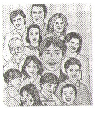
It has been estimated worldwide that epilepsy occurs in 0.5% to 1% of any country’s population. A survey conducted by the Department of Neurology, Jinnah Postgraduate Medical Centre, Karachi, in 1989-1988, revealed that 1% of the population of Pakistan was suffering from epilepsy; being tow times more common in children. The disorder was found to be twice as common in the rural areas as a compared to the urban. Only 30% of the afflicted people were taking medicines regularly; the majority in the urban areas. Infact, only 2% of the affected rural population was on regular medicines. Unfortunately, in Pakistan experts in epilepsy (neurophysisians) are only a handful and hence the role of health education is extremely important.
DOES EPILEPSY OCCUR DURING A SPECIFIC AGE PERIOD?

Epilepsy can occur at any age. However, it is most common amongst children and young adults. What is more significant with reference to age is the nature of the underlying cause, which tends to be harmless or insignificant in the younger age group and may have a more serious basis in the middle to elderly aged people e.g. stroke, brain tumours etc. It is important to note that infancy and childhood are crucial period in one’s life during which development of body and mind occurs; this in turn is responsible for the development on an independent and sound personality. Early control of epilepsy helps in normal development of the child’s brain and educational pursuits. Since people with epilepsy yare as intelligent as anyone without it, they can be useful members of our society.
WHAT ARE THE CUASE OF EPILEPSY?
As mentioned above, epilepsy is a symptom of various disorders and diseases. Following are the main causes:
- Non-medical cause (minor short-circuiting or disturbance in neurochemicals):

Ninety percent of people with epilepsy do not suffer from any apparent medical disease. Some short-circuiting or alteration in the chemistry of the well-integrated nervous system creates and “electrical brain storm” which may manifest as an epileptic attach. Such persons are physically as healthy and mentally as alert as any one else. Unfortunately, unjustified social discrimination, fear amongst parents and disallowance of schools to admin such children, puts them under stress. This psychological trauma has a deleterious effect on the child’s developing personality. Avoidance of unnecessary discriminatory attitude and compliance to treatment for the assigned duration (to be decided by the doctor) makes persons with epilepsy no different from you and me.
- Temporary medical disorder:

Temporary brain diseases e.g. meningitis, encephalitis, brain tumour, hemorrhage/interruption of blood supply to the brain (storke/paralysis) can precipitate an epilepsy attack. In such persons, other than epilepsy, distinct signs and symptoms are evident which facilitate diagnosis of the disease. Attacks of epilepsy may increase with severity of the disease and may continue to do so even after it has been treated. Usually this type of epilepsy remits with the treatment of the disease.
- Permanent brain disorders:

Congenital malformation of the brain, brain injury (at, before or after) birth, and infections of the brain at birth can cause some permanent brain damage, which in turn becomes a focus of an epilepsy attack. These attacks occur rarely. A person with permanent brain damage and fits can be easily distinguished from persons with epilepsy.
NON-EPILEPTIC FITS.
- Fits during pregnancy is not epilepsy:

A few pregnant women experience fits, especially during the last three months. These are similar to episodes of epilepsy. However, they are accompanied by a rise in blood pressure and oedema. Fits and raised blood pressure are controlled with injectables. With delivery, the fits discontinue.
- In children, fits with fever is not epilepsy:

Febrile convulsions can occur in children running high-grade fever; about 5% can be affected. Although they appear to be similar to an epilepsy attack, they are not considered to be epilepsy. They tend to naturally remit by the age of 5 years. Usually no medication is prescribed for these fits. If care is taken not to let the child’s body temperature to rise above 101`F, changes of fits diminish. Tap water sponging and use of fever lowering medicine is suggested. The child must be seen by a doctor to evaluate the cause of fever and treat it and also, to rule out the possibility of epilepsy.
IS EPILEPSY OF DIFFERENT TYPES?
Attack of epilepsy have numerous different characters and presentations and differ from person to person. For convenience they can be roughly divided into tow categories: ‘major epilepsy’ and ‘minor epilepsy’.
In ‘major epilepsy’ the person becomes unconscious, has convulsions and may injure oneself. He may also bite his tongue and become incontinent of urine and faeces. In ‘minor epilepsy’ there are brief disturbances of consciousness such as “lost from surroundings’ or appearing to be ‘day dreaming’ along with ‘brief body jerks’. Some patients talk during these attacks but this is involuntary and the patient does not recall on recovery.
CAN A PERSON WITH EPILEPSY LEAD A SUCCESSFUL LIFE?
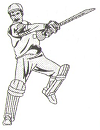

Absolutely! Epilepsy does not affect the intelligence, drive and capability of the affected person. Not only can a person with epilepsy lead a normal life but can also prove themselves to be extremely successful in their chosen field of interest. As mentioned above, about 90% of people with epilepsy have normal cognition. If their epilepsy is controlled early during childhood, they grow to become healthy, independent and fruitful members of the society. It is worthy to note the names of some renowned personalities, who inspite of suffering from epilepsy reached the zenith in their respective chosen fields. Alexander the Great (King of Macedonia), Caesar (Emperor of Rome), Napoleon Bonaparte (Fresh General and Emperor), Joan of Arc, Peter (Czar of Russia), Alfred Noble (scientist and pioneer of the Nobel Prize), Isaac Newton (English scientist) Socrates (Greek philosopher), Pythagoras (Greek mathematician and philosopher), Lord Byron (English poet), Dostoyevsky (Russian writer), Lord Tennyson (English poet), Agatha Christie (English mystery novel-writer), Charles Dickens (English novelist). Tolstoy (Russian writer), Leonardo da Vinci (Italian sculptor and painter of Mona Lisa), Michelangelo (Italian sculptor and painter), Vincent van Gogh (Dutch painter, Richard Burton (English actor), Tony Greig (English cricketer), Jonty Rhodes (South African cricketer and many others had epilepsy.
EPILEPSY IN SCHOOL CHILDREN.
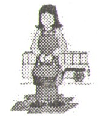
Epilepsy is commoner in the young; of every 100 children 2 have epilepsy. Epilepsy or its treatment does not affect the child’s intelligence or school achievements. As any other normal healthy children, ones with epilepsy must continue education and training in any field of their choice. Children must participate in all school activities and games. The parents and teachers of such children should consciously avoid over protection or discriminatory attitude, as this may result in behavioral problem, which may remain life long.
IS IT SAFE FOR A PERSON WITH EPILEPSY TO DRIVE?

People with uncontrolled epilepsy are a hazard to themselves and others on the roads, However, people whose attacks have been under control for more than 1 year and continue to take medicines regularly and are under regular medical check-ups are safe enough to drive a car or a motorcycle.
CAN A PERSON WITH EPILEPSY MARRY AND HAVE CHILDREN?
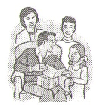
Physically, people with epilepsy are as healthy as any one else, hence can marry and have children. There is a very rare chance of occurrence of this order in the next generation. All persons who wish to have children must consult a neurophysician with reference to treatment/choice of medicine and a pregnant female must go for regular check ups to the same.
IS THERE ANY STIGMA ATTACHED WITH EPILEPSY?

Historically people with epilepsy were highly stigmatized, In the older times (also currently in some countries) people with epilepsy were treated as lepers. Even today people in certain African countries believe that epilepsy can spread by skin contact and saliva of a patient. Inspire of an increase in public education, people with epilepsy are treated differently as they are considered ‘less intelligent’ and ‘dangerous to others’. They have difficulty in getting a job and are often sub-optimally employed. People with epilepsy are as intelligent and capable as any other member of the society and if his epilepsy is controlled he can perform any task efficiently.
Stigma against children with epilepsy studying in school is not so much by their peers as by their teachers who become too frightened by an attack. Rather than encouraging social acceptability f persons with handicaps, children with epilepsy may be asked to leave the school. We strongly oppose this discriminatory attitude. For this reason we have prepared a separate manual especially for the educationists.
DO PEOPLE WITH EPILEPSY SUFFER FROM PSYCHIATRIC PROBLEMS?
Epilepsy per se does not cause psychiatric illness. People with epilepsy are physically and mentally fit. Due to unnecessary over protectiveness of parents and sheltered upbringing, biased attribute of teachers, relatives and friends and discriminatory attitude of the society on the whole, result in lack of confidence and an inferiority complex in the person with epilepsy. If epilepsy is uncontrolled the sufferer attends school/college/work irregularly along with many restrictions by the parents and relatives. ‘Medicines and an unbiased attitude’ is the key to success of epilepsy treatment.
INVESTIGATIONS FOR DIAGNOSIS OF EPILEPSY.
As per doctor’s advice, the following investigations for the diagnosis of epilepsy can be carried out.
- E.G. Test: As mentioned earlier, the brain, spinal cord, nerves and muscles constitute a well-integrated electronic system in which there is a continuously ongoing electrical activity. These electrical waves can be picked up and recorded by an E.E.G. machine, which is similar to an E.C.G. machine. An E.E.G. recording can diagnose different types of epilepsy. As each type of epilepsy can be effectively treated with specific medicines, this test is also helpful in treatment.
- C.T scan: It is a computerized X–ray machine which helps in localizing the physical disorder in the brain e.g. stroke, tumour etc.
- M.R.I scan: This is also a type of scan in which instead of the X-ray radiations, magnetic waves are used to reveal a brain lesion. The computerized machine can visually slice the brain at different levels thus helping in exact localization.
- Ultrasound: It is helpful in infants in whom the skull bones are soft and the joints not fully closed. This allows easy penetration of ultrasound waves and pick up brain images. The utility of ultrasound is only up to 5 years of age.
- Assessment of drug levels in the blood: This is not mandatory for treatment of epilepsy. The specialist usually requests it when a person’s epilepsy is not under control and there is a suspicion of non-compliance.
HOW IS EPILEPSY TREATED?

Presently there are many drugs for the treatment of epilepsy. Broadly they can be divided into two main groups.

Injectables: These are used to control continuous episodes of epilepsy fits and fits occurring during pregnancy.

Tablets/capsules/syrups: These help in preventing future attacks of epilepsy. They are to be bused continuously for a minimum of 3-5 years.
It must be emphasized that If the prescribed medicines are suddenly stopped or the dose in decreased by oneself, there is an increased possibility of having rebound attacks; rather a series of attacks at regular intervals can occur which can be life threatening. Long-term with anti-epileptic drugs is considered to have effect on one’s intelligence. This is absolutely fallacious.
WHEN DOES THE TENDENCY FOR AN EPILEPSY ATTACK INCREASE?
- Non-compliance of prescribed medications.
- Mental stress/tension
- Laziness and idleness
- Lethargy
- Disturbed sleep
- In women, during menstrual periods
- Fever due to any cause
- Intake of addictives e.g. alcohol, opium, cannabis, etc.
- Decreased blood sugar levels, which may occur due to not taking meals at the right time.
- Distortion of a picture on television or computer screen e.g. snowing of the picture.
- Reflection of sunrays from water surface.
WHAT MEASURES SHOULD BE TAKEN DURING AN EPILEPSY ATTACK?

A few patients are aware of the impending epilepsy attack. They should lie down on the floor or on a bed. If they are unaware of the attacks then they cannot take care of themselves and the total responsibility will lie on the relatives. Instead of rushing to a doctor, one can themselves take care of the convulsing people. Infact, by the time the doctor arrives the attack is over.
- If possible make the patient to lie on a carpet or a floor mat.
- Remove any object in the vicinity, which would cause injury to the convulsing person.
- Open the collar button of his shirt. Remove any tie, muffler or scarf from around his neck.
- Do not forcibly try to open the mouth; clean the saliva around it with a cloth or a tissue.
- It is important to note that during an epilepsy attack do not force water or any other drink into the Peron’s mouth as this can choke him.
- Make the patient to lie on one side, as shown in the diagram.
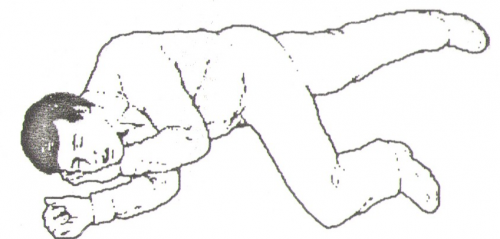
- Te convulsing person may sometimes become incontinent of urine or faeces. In such a situation change the person’s clothes.
- After the attack is over, some people remain temporarily confused and disoriented and may go into deep sleep. Do not forcibly try to awaken him.
- A Single attack does not require immediate medical help. However, if they are occurring at frequent intervals without the patient recovering from the previous attack, the person should be rushed to a hospital.
WHAT PRECAUTIONS SHOULD A PERSON WITH EPILEPSY TAKE FOR HIMSELF?
People with epilepsy need to take a few precautions.
- A person with epilepsy should avoid riding a bicycle or a motorcycle or driving a car, bus, rickshaw, etc. If while doing so, he has an attack, he is not only endangering his own life but that of others too.
- Avoid working on open machinery.
- Avoid working at heights.
- Swimming is not prohibited; however, it should be done under the supervision of an expert swimmer.
- For more information regarding work and hobbies contact your treating doctor or a neurophysician.
YOUR ROLE IN DIAGNOSIS AND TREATMENT OF EPILEPSY.

It is your prime duty to ensure that your relative with epilepsy is taking the prescribed medicine, in the right dose, at the right time; without missing event a single dose. One should give a detail eye-witness account of an epilepsy attack to the treating physician, which will help in its proper diagnosis and treatment. Make a chart as follows and note the required information and present it to the treating doctor at each visit.